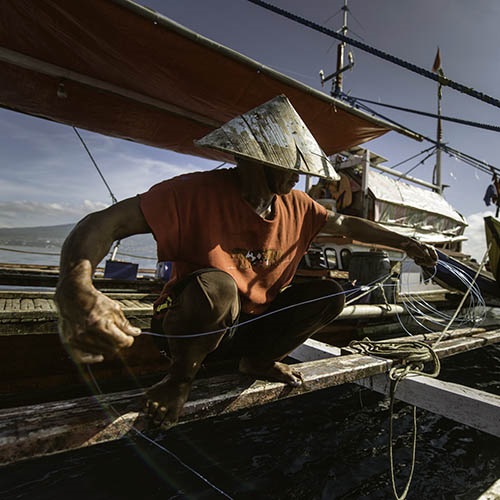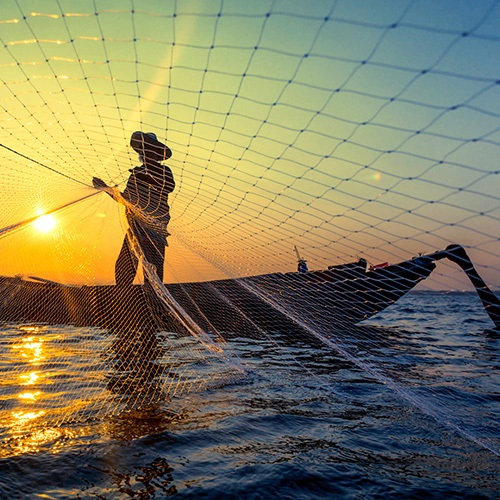WWF-India and deep-sea shrimp trawl fishery Kerala
Amount awarded: £44,310
This project is supporting a fishery improvement project (FIP) for the deep-sea shrimp fishery in Kerala, India. WWF-India in collaboration with a number of partners in the region, aims to help the fishery progress towards MSC certification by 2025.
The fishery targets Arabian red shrimp, deep- sea shrimp and Indian nylon shrimp using trawl gear. The fishery operates off Kerala’s coast mainly in Kollam Bank where around 80% of Kerala’s deep-sea shrimp are caught. The fishery is verified through the In-Transition to MSC Program, making it eligible for Transition Assistance Funding.
Most of the catch is exported to the EU and US. Alongside sustainability, market access has been a driving force for the fishery to seek certification.
In 2019, the Seafood Exporters Association of India and the Forum for Deep-sea Shrimp Sustainability developed an action plan and initiated an MSC pre-assessment. This showed that the fishery does not have in place important management systems, known as harvest strategies or harvest control rules, to show that its practices are sustainable.
WWF-India is working with industry, government, fishers and NGO stakeholders to undertake a stock assessment. This is needed to understand if the shrimp are at healthy levels and determine a reference point for sustainable fishing so that harvest control rules can be agreed. Their Ocean Stewardship Fund grant will also help the fishery meet other requirements for certification. These include reducing bycatch and assessing its impact on the local habitat and ecosystem.
Understanding the health of the shrimp stocks
Since the project began, local scientists have conducted a review of the training programme provided to teach port-side enumerations on how to collect accurate data. A revised training plan has been implemented in order to improve the quality of the data which is necessary for an accurate stock assessment.
A clear timeline for when stock assessments need to be conducted has been established as well as the introduction of an online data collection system. New research published using catch per unit effort (CPUE) methods is also being used to help understand the true abundance of the stock. An ecological risk assessment will also be used to support the stock assessment.
Trialling bycatch reduction devices
Bycatch reduction devices act as ocean sieves, helping juvenile shrimp to escape through a fine mesh at the end of the trawl net while retaining the larger shrimp catch. These devices have been trialled at Kollam fishing harbour and currently in Kochi. Preliminary results show the devices are successfully helping to catch fewer juvenile shrimp. Taking juvenile shrimp out of the ocean before they have reproduced can disrupt stock levels and lead to overfishing. So, it is important that the amount of juvenile shrimp that are fished is limited, so the stock remains at sustainable levels. The work is being carried out in partnership with:
- Department of Fisheries, Government of Kerala
- The Central Institute of Fisheries Technology, Government of India
- NETFISH-MPEDA, India Ministry of Commerce
- All Kerala Fishing Boat Operators Association (AKFBOA)
- Sustainable Seafood Network of India (SSNI)
- WWF-India
Improving enforcement of fisheries management
The fishery is also struggling with a lack of AIS (Automatic Identification System) data which publicly tracks a vessels location and transmits this to vessel traffic services. A local government scheme is offering financial assistance to fisheries to have this fixed to their vessels so that it can be used to map the operational fishing area.
Government scientists have also developed a new trophic model covering 86,894km2 and incorporating more than 400 species. The fishery’s shrimp catch data will be included in the model to analyse what impact the fishery may have on the wider ecosystem. This is essential to know if it is to create a management plan that successfully mitigates such impacts.
“As most fisheries resources are overexploited in India, bringing sustainability is the only way by which the resources can be conserved and protected for future generations. This funding will help enable us to implement the fishery improvement project activities for these species of shrimp which are of great commercial importance”
WWF India
Find out more

Our impact projects
Discover projects supported through the Ocean Stewardship Fund that are helping to grow sustainable fishing worldwide.

The Ocean Stewardship Fund
The Ocean Stewardship Fund offers grants to both MSC certified sustainable fisheries and improving fisheries.
